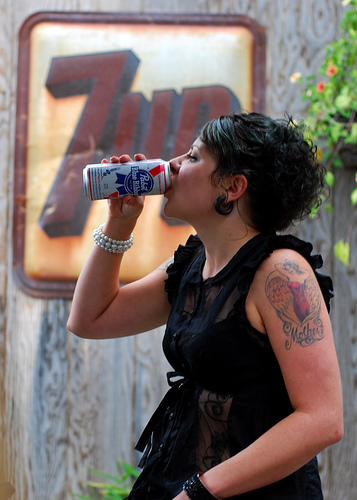When can I have a beer?

You must be twenty-one in most states to buy or drink beer, wine, or any alcoholic beverage. If you break the law and are caught drinking, you may be fined and given community service hours to complete. The person who sells or gives you alcohol may also be prosecuted.
Even if you aren′t legally intoxicated (your blood alcohol level is over your state′s limit), you can still get into trouble for being under the influence of alcohol. This means that you aren′t legally drunk, but your senses are affected.
You may find yourself in dangerous situations and unable to make good choices when you have drugs or alcohol in your system. Poor decisions made under the influence may have a drastic impact on the rest of your life.

Photo by Jesse Millan
You’ve probably heard a lot about the dangers of alcohol abuse. The statistics about alcohol-related traffic accidents and teen deaths speak for themselves. The medical facts are equally clear: alcohol damages your brain cells, inflames the stomach lining, kills liver cells, blocks memory, dulls your senses, and has been linked to birth defects in infants.
Did you know that in 2008 almost 5000 teens died in traffic accidents in the U.S. – many of those were alcohol-related.
Unbelieveable: In March, 2011, hospital authorities in London, England, reported that they treated a three-year-old child who had been given alcohol regularly. The case highlights a new low in Britain’s struggle to control a binge drinking culture that has seen alcohol-related deaths double in the past two decades.
Interesting: A law in Utah went into effect on January 1, 2011 prohibiting “daily drink specials.” This essentially ends “Happy Hour.”
Resources:
www.stopalcoholabuse.gov A governmental interagency committee that collects data on underage drinking in the U.S. and issues an annual report.
Al-Anon and Alateen
1-800-344-2666
www.al-anon.alateen.org
Al-Anon is a worldwide organization that provides support to families and friends of alcoholics; Alateen is for younger family members who are affected by someone else′s drinking. Request their free packet of teen materials.Alcoholics Anonymous
AA World Services, Inc.
P.O. Box 459
Grand Central Station
New York, NY 10163
(212) 870-3400
www.aa.org
Since its founding in 1935, AA has helped millions of men and women around the world to stop drinking.American Council on Alcoholism Helpline
1-800-527-5344
Referrals to alcohol treatment programs nationwide and educational materials.Mental Help Net
www.mentalhelp.net
Tons of links to sites with self-help information on a wide variety of health issues including alcohol and drug abuse.Online AA Resources
www.recovery.org
A comprehensive collection of information on AA with links to related resources.



The same goes for the accompaniment of a legal spouse who is 21 or older for a person under 21 but over 18 (because in most states it is illegal to be married before turning 18)
Regarding marriage, many states allow minors to marry, say 15 and older, when the parents consent and/or permission is granted by a judge. Each state has its own laws on this.
Actually, in some states, including Louisiana, it is legal for people under 21 (but generally 18 or older) to consume alcohol when accompanied by a parent or guardian, what this specifically entails is up to the cop’s discretion (i.e. what does “accompanied” mean exactly)
We assume, under Louisiana law, it means when a parent or legal guardian is with the under-age person. It wouldn’t mean the person has their parent’s permission when they’re out with friends. The parents must be with the minor, for example, out to dinner.
(This is information only – not legal advice).
My sister is going abroad where the laws are set at a much lower age, which counries laws does she have to follow? What about youth from other countries where they are allowed to legally drink visiting the US?
Dear KellyAnn: The general law regarding travel and visiting foreign countries requires the tourist or exchange-student to follow the laws of the host country. The same goes for a visitor to the U.S. – they are expected to follow our laws, even though they may be stricter than their own at home.